
Solar Customer Portal: Why your company can't thrive without
If you don’t know yet by reading the title of this post just do a quick search in Google for Solar Customer Portal and you will eventually find out.
You know what all the big box, well known, multi million dollar solar installers have in common? Household names like Sunrun, SolarWinds, ADT Solar or Sunnova?
It’s easy to figure out why all of them decide or are forced to run their own Customer Portals. Nor is it a surprise that every major hardware manufacturer, from Enphase, to SolarEdge and SMA have their own branded portals as well.
Free Audit: If you wonder what a Solar Customer Portal can do for your business, jump on a FREE audit call where we take an in-depth look at your business and give you 2 to 3 actionable recommendations to grow it.
Having a customer portal gives your customers the trust that your business is able to deliver on the results you promised and additionally streamlines communications between you and the customer. This results in happier customers, happier employees, more 5-star reviews and most importantly:
More referral business.
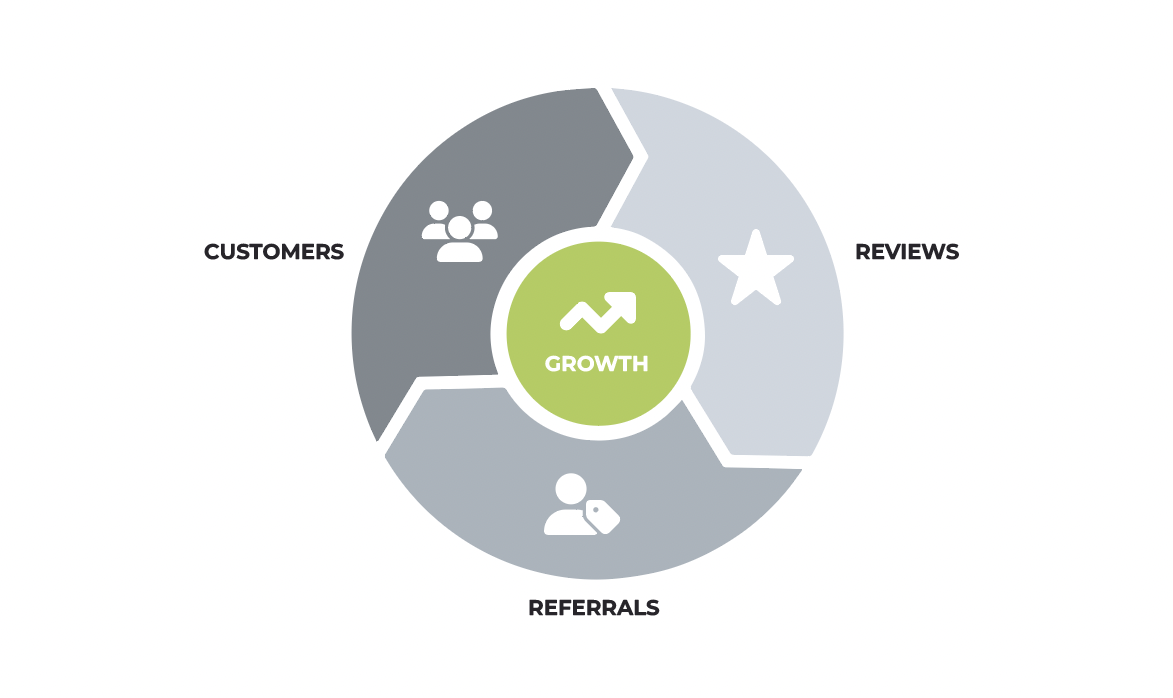
If you are tired of spending time and money on traditional marketing methods on already crowded channels and have had a blind spot on one of the most valuable assets your company has then this is for you. (Hint: It’s your existing customers who already know and trust you)
This might be no big news, yet from our conversation with hundreds of large and independent solar installers over the past year we noticed that the majority struggles to build their own customer portal:
Either they have tried an existing off the shelf solution, were brave enough to attempt building their own or even worse: gave up on the idea altogether.
Our own company Ipsun Solar was exactly the same, but before we get to how we solved the problem let’s talk about Customer Portals in general and why they are a necessity for every B2C business today.
What is a Customer Portal
A customer portal is the cornerstone between your business and your customers providing useful information and access to services through a secure and private online portal only accessible behind a login.
Depending on the type of business this can entail everything from accessing documents, contracts or bills, opening support tickets or making new orders.
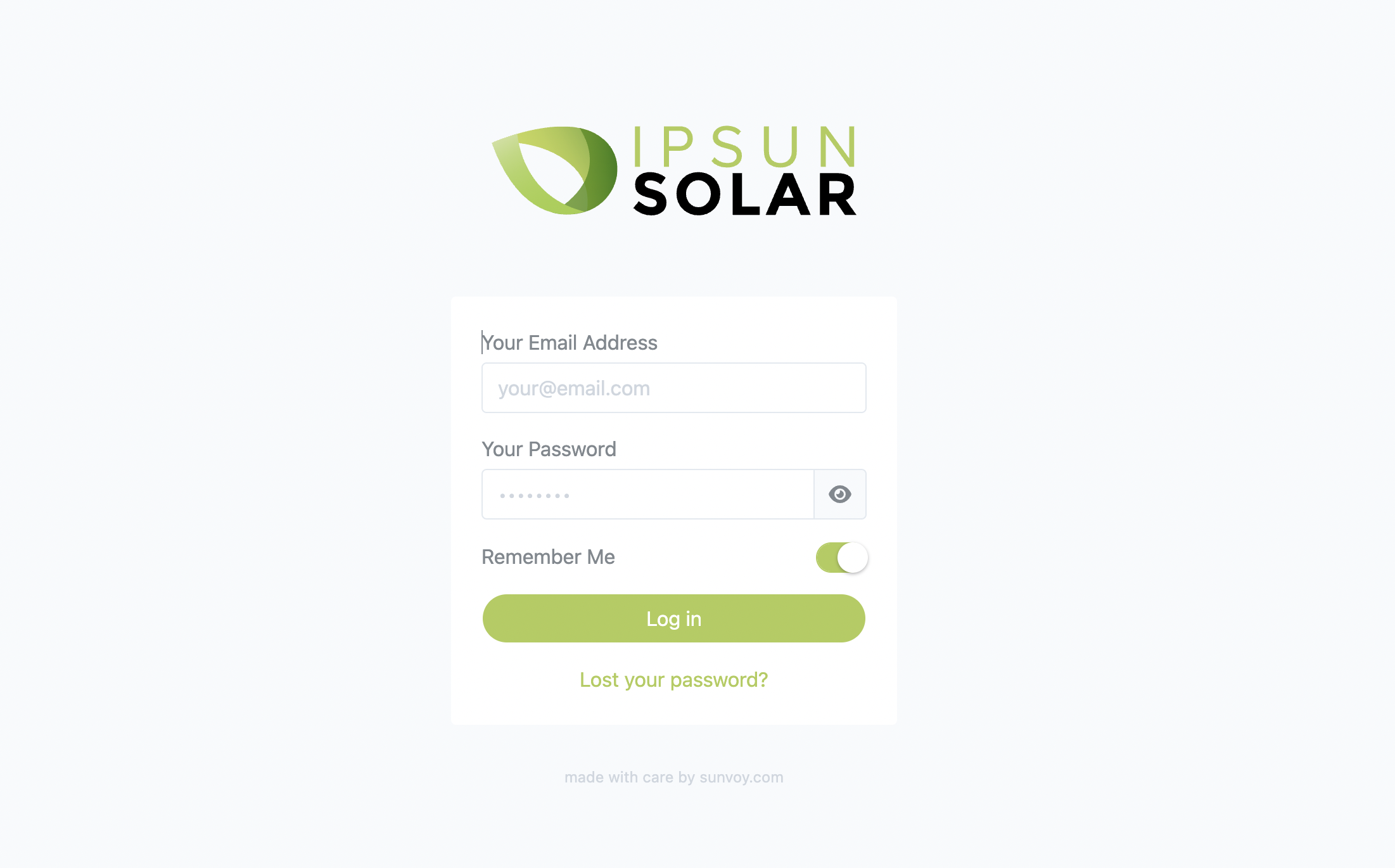
What makes a Solar Customer Portal special
A solar customer portal on the other hand allows all of the above, but is tailored to the specific requirements of the solar industry.
There are two distinct phases after a customer has signed a contract with your company:
Before and after the installation of the solar system.
During the installation the customer portal should keep track of the project so the customer always understands exactly where he is in the process and what lies ahead while providing easy to reach contact information in case something comes up.
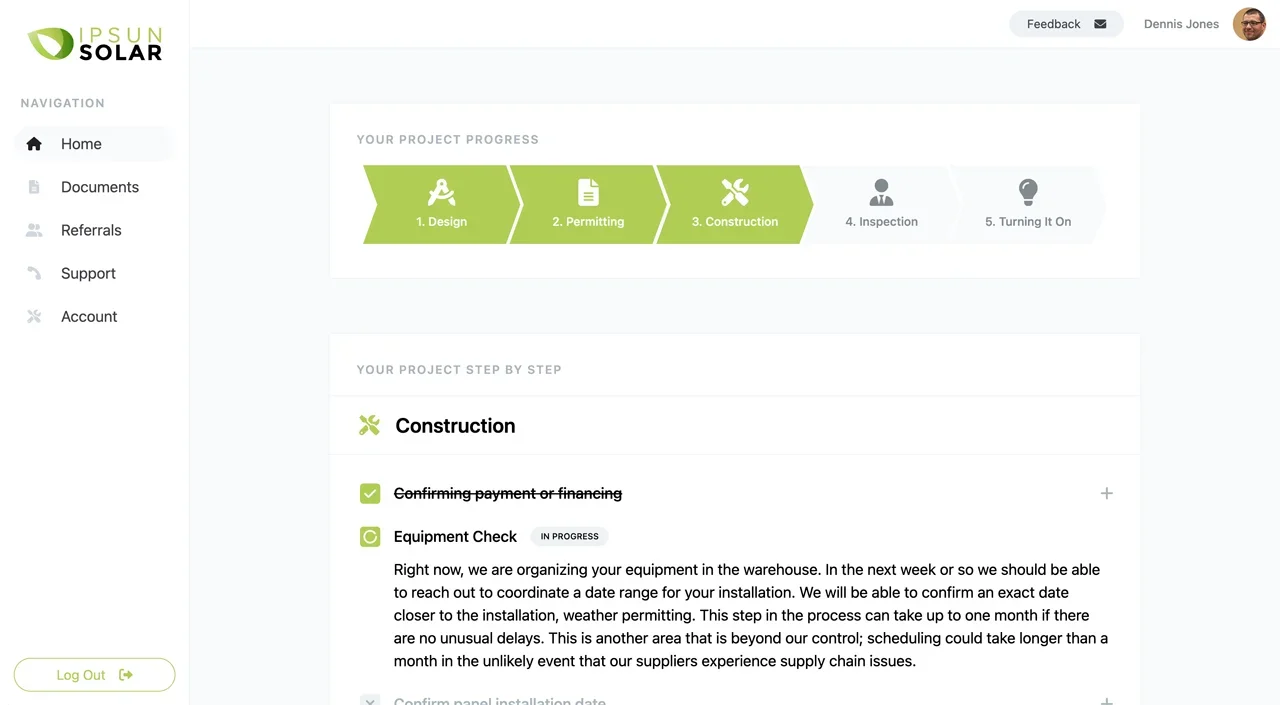
After the installation your customers should be able to use the portal not just to track their energy production and consumption, but as well to see their battery usage, their energy flow from and to the grid, or access other solar specific functionality such as access to financing, incentives or warranties.
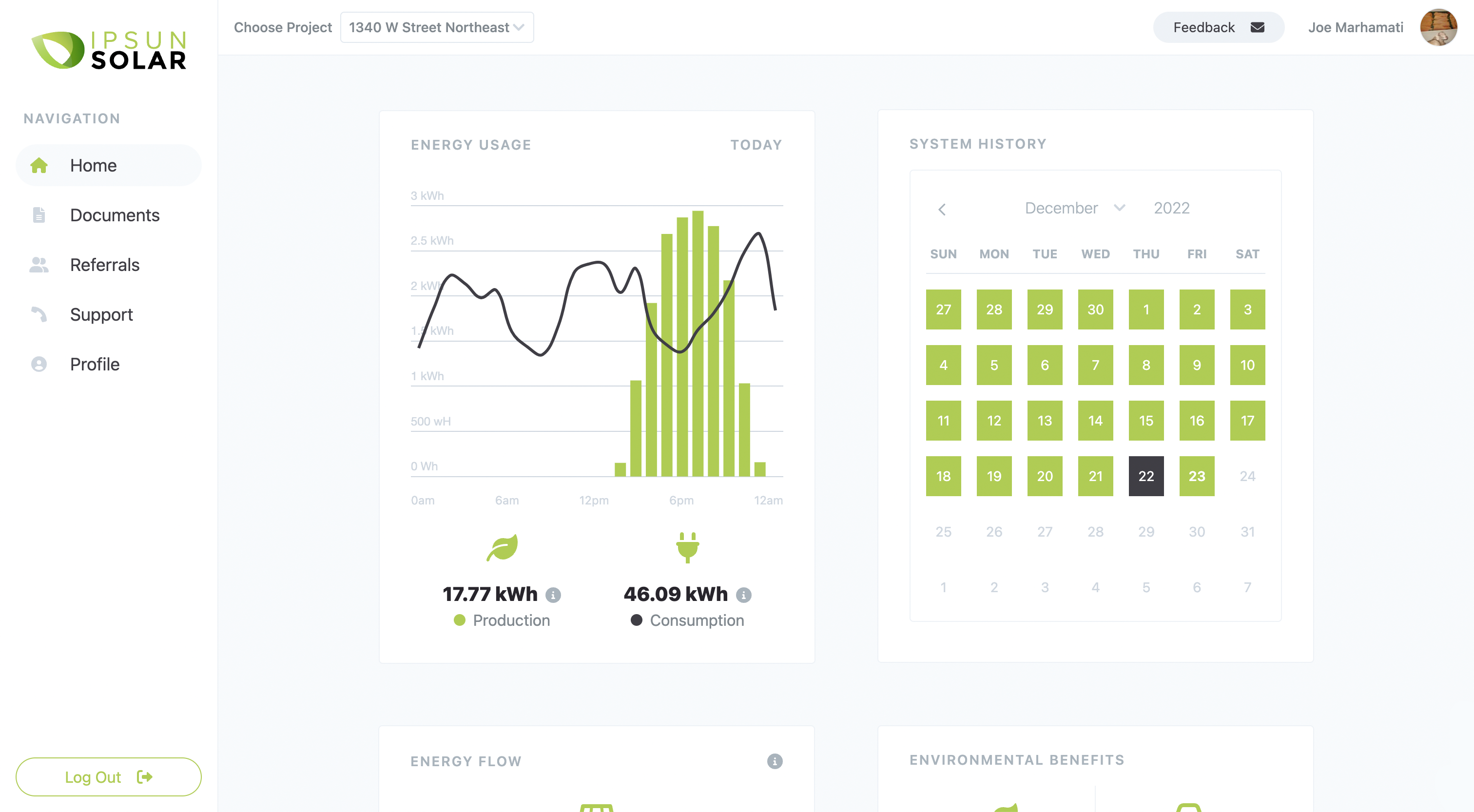
Ideally all of this ties in and integrates tightly with any other software or hardware your solar company is already using, offering consumers for example the option to control their breakers or monitor energy consumption on a circuit or appliance level.
If you are using a truly great solar customer portal then the above is not just true for the end customer but as well for your employees:
Instead of just having a list of all of your customers which your CRM hopefully already provides, that list get’s enriched with useful information such as the inverter brand and model, the panel brand and model or the current status of the system. Or even permits you to display your whole fleet on a smart, location enabled map that updates in real time:
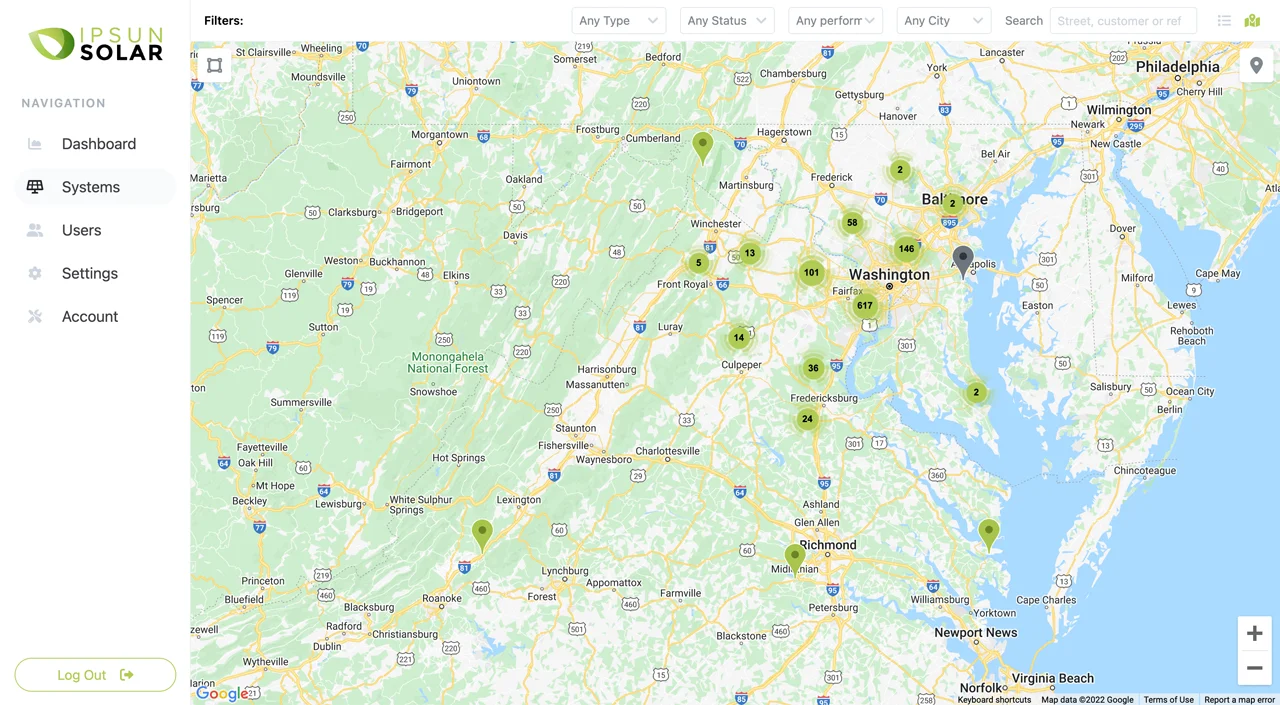
Within Sunvoy (our unique solution as a solar customer portal we will tell you more about in just a minute) this trickles down even to every single area of the customer portal - both for the end customer or your employees.
Quick example:
When opening a support ticket you are able to see the exact system information such as inverter status or energy produced in the past week together with how the actual energy production compares to the estimated. Or conveniently open a Google Maps Link to organise your truck rolls, deciding based on all of the readily available information if they are even necessary in the first place.
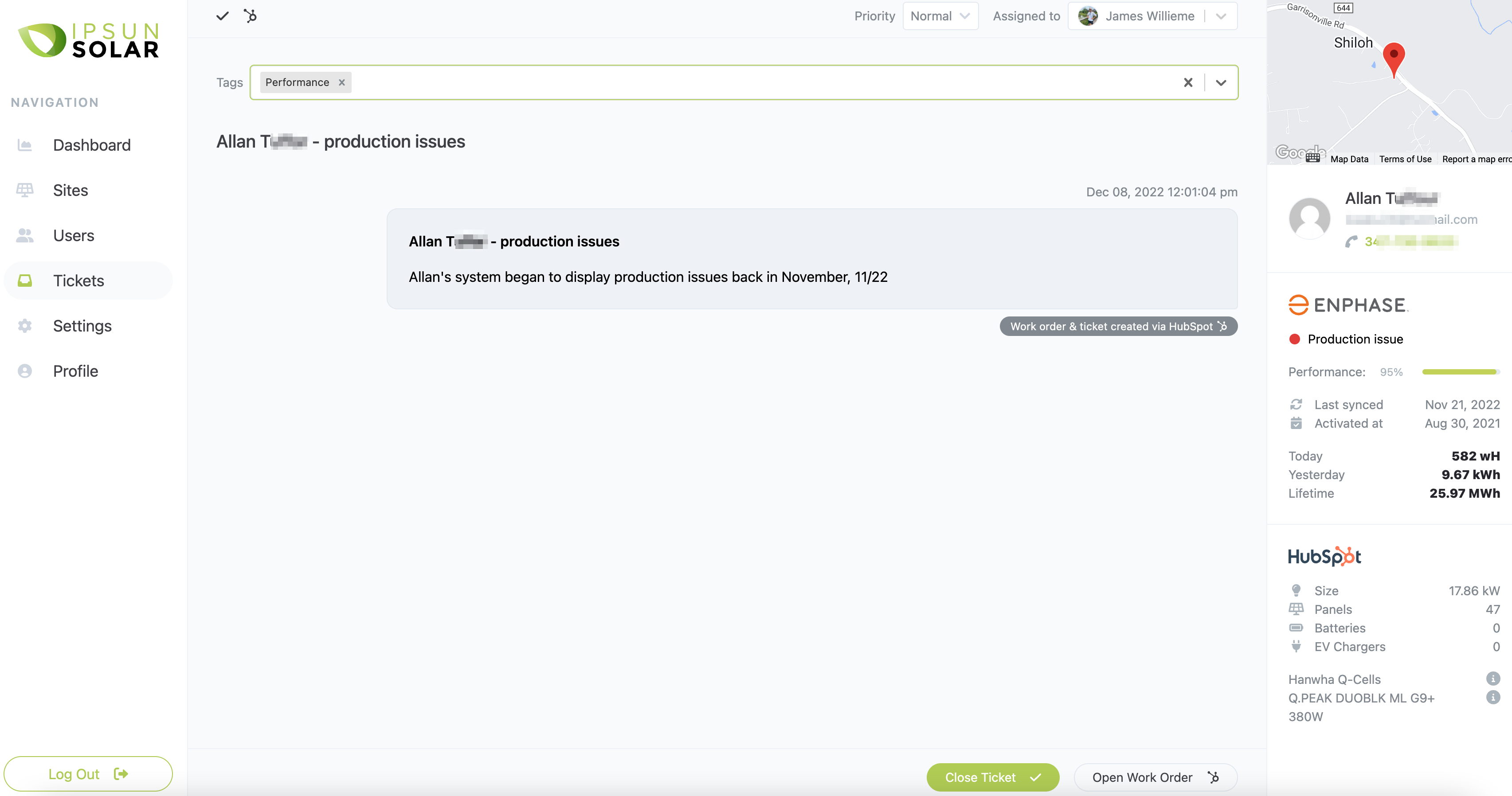
What are the benefits of a Solar Customer Portal
Let’s keep functionality aside for a moment and focus on what actually matters:
How does this affect your bottom line and overall solar business success and growth?
You should have heard the saying that you only get one chance to make a first impression.
The customer portal is part of this. It’s the centerpiece of your customer relationship and first deliverable they receive after signing a contract. If you have one it proves immediately to your customers that you are capable to deliver on your promises before the first solar panel has even been ordered.
If you don't you start off the customer relationship on the wrong foot.
But just having one is not enough. It must look and work professional and come with your own branding so you begin the 25 year customer relationship with a considerable advance in trust.
(Trust that is necessary if for some reason something goes wrong like inevitable supply chain issues completely out of your control).
Go read a handful of bad solar reviews. Seriously, we will wait for you. If you do, you will notice that the majority of bad reviews are coming down to: poor communication.
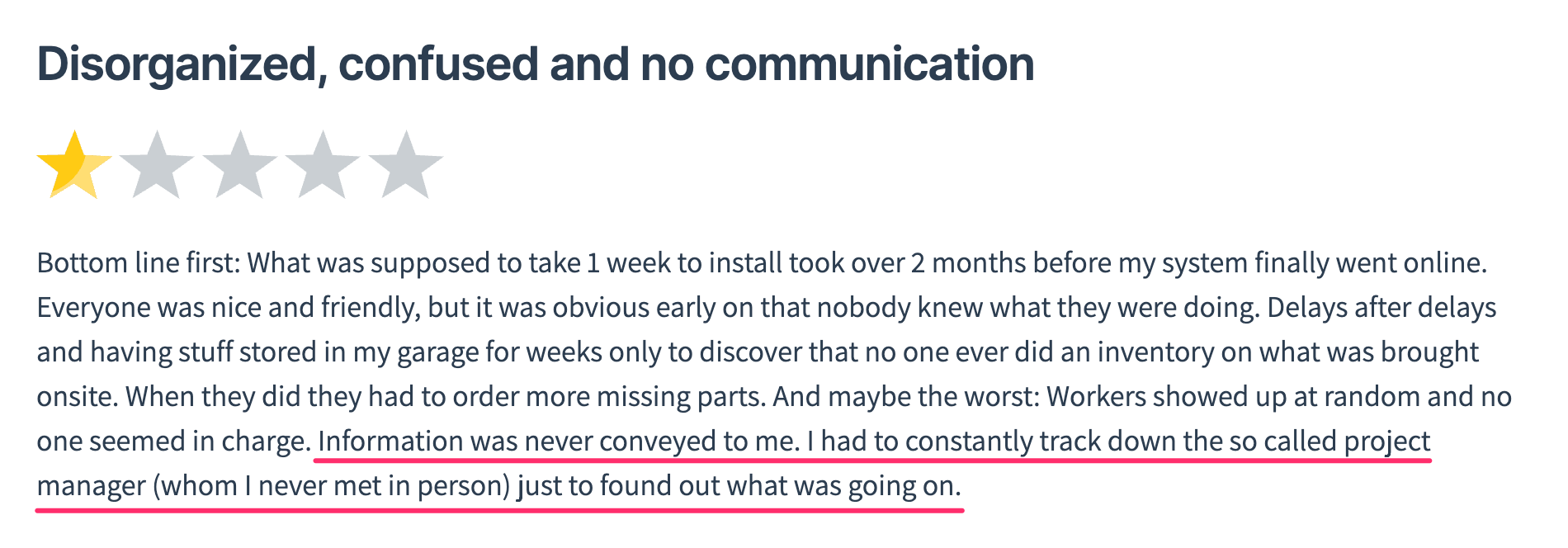
Instead of having the customer pulling you for information by calling and emailing your project managers constantly, relevant information is conveniently delivered directly to them right on time.
This means there is less ambiguity about where their project is currently at, what has already been done or what lies ahead.
If you put a baseline of communication in place you will have less bad reviews because of poor communications. Even if you are doing great, there is always the factor of human error: For example when a project manager goes on vacation and forgets to set up an auto responder. You also have these unique individuals and special projects that automation can’t easily deal with, but the vast majority of your projects should be following a distinct solar customer journey process.
The improved customer experience immediately reflects itself in more and better reviews. (Remember that you need to work twice as hard for getting good reviews than you need for bad ones). And by now you should know that 5 star reviews are one of the main drivers for customers purchasing decisions.
But it doesn’t end here:
While we religiously brand our own companies trucks and uniforms we forget that the average customer only sees us a handful of times. But they open their phone religiously multiple times a day.
So at the end of the installation process, instead of handing the keys to your valuable customer relationship voluntarily over to a billion dollar corporation you can retain that relationship for your own company. Reminding them every day when they check in on their solar system of the brand and company that actually installed their system and enabled them to produce clean energy.
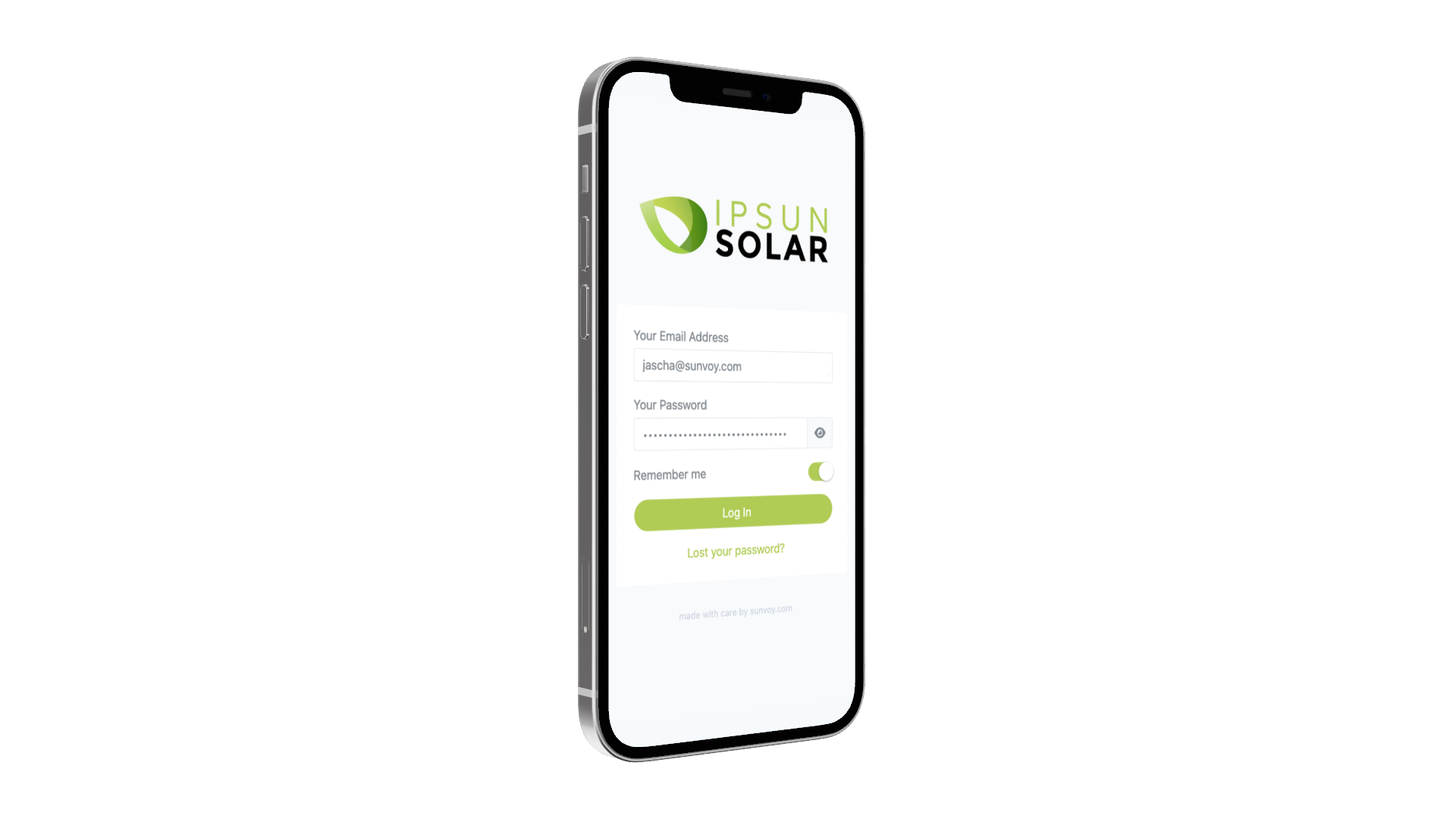
What this actually does is implementing a powerful and fully automated referral engine:
New high quality business comes to you, instead of you having to advertise and fight over expensive low quality leads. This lowers your cost of acquisition not only by bringing in more business into your door, but as well requiring less manual work from employees to deliver a better overall customer experience.
What basic Functionality should a Customer Portal provide
- A secure Login. As you are dealing with sensitive data this is paramount. But even more important access to the portal should be governed by your already existing systems. You gain nothing if you re-introduce human error by an employee having manually enable access to a customer portal. So ideally the customer portal is smart enough to understand when a potential deal turns into a customer based on your CRM Integration, and automatically sends the relevant login information to all relevant parties.
- Allow access to multiple stakeholders. For the average residential solar systems there are usually already two stake holders: Husband and Wife. So it’s naturally that both should have access to the same system through separate logins. But it usually goes further: A lot of times houses get sold and access to the solar system needs to be transfered as part of the transaction. So instead of having to pay and change access in complicated ways through the inverter portal you should have the ability to change it with a single click in the customer portal.
- Allow access to multiple projects. Simplest example? It’s more common than you think that people have both a residential system and a vacation home or hut where they want to got solar as well after they have started to enjoy the benefit. But even more important for commercial customers: You want the ability for multiple stakeholders to check on multiple systems even if they are not installed in the same geographical area.
- Provide project tracking. You don’t want your employees to learn yet another system or manually keep track of what’s going on. All of that should happen completely automatically just as your operational teams advance with their work to get a customer from signed contract to PTO. Your customer portal should automatically update in realtime as your employees are taking action in your CRM.
- Send automated communications. This provides the above mentioned baseline communication to your customers so that you never get a bad review because of poor communication. Ideally this communication goes on even after PTO, sending monthly reports with your own company logo and tying in with your marketing departments current most important message. Imagine instead of sending a newsletter about your company every month, you can send personalized relevant milestone notifications such as “You have just produced your first 1000kWh in clean energy”.
- Beautiful on any device. As a solar company you are most likely serving a broad type of different customers. Their preferred way of access is diverse as your customer base. So ideally the portal is accessible on the web but looks beautiful on any device. This is as well important for different teams of your employees, where people in the field will prefer mobile access vs. people in the office who might prefer a desktop client.
- Referral Program. This might be one of the most important features of your customer portal. Ideally this is “conversion optimized” meaning it actually incentivizes customers to take the desired action of sharing your company. This can be accomplished not just through monetary incentives, but as well smart landingpage design that takes in mind customer testimonials, photos, the specific design of their system, etc.
- Support Tickets. There will always be an issue at some point of the customer relationship. Ideally you have processes in place to turn your O&M team from a pure cost center into a profit center, but even without that your customer portal should allow customers to open tickets and display them to your employees with relevant and important information so they can accurately troubleshoot.
- Solar fleet Monitoring. Displaying a list of all your systems, independent of the hardware manufacturer you actually used is already a great benefit. No more logging into three different portals and having dozens of tabs open just to figure out in which portal a customer resides. But ideally this comes with active monitoring as well, where the actual production is compared with the estimated production data.
- Powerful Automations. Imagine if you could streamline and automate much of the mudane and repetitive day to day tasks your employees are required to do. And tie it together with valuable marketing messages your marketing team would love you for. Instead of typing in the same customer information again and again, it just happens automatically in the background. Simple example: Automatically order an EagleView Report when a project get’s signed, automatically create an enphase activation once a project reaches a certain step or automatically ask for a review via a text message once a project has reached PTO. The possibilities are endless.
What type of Solar Integrations do you need
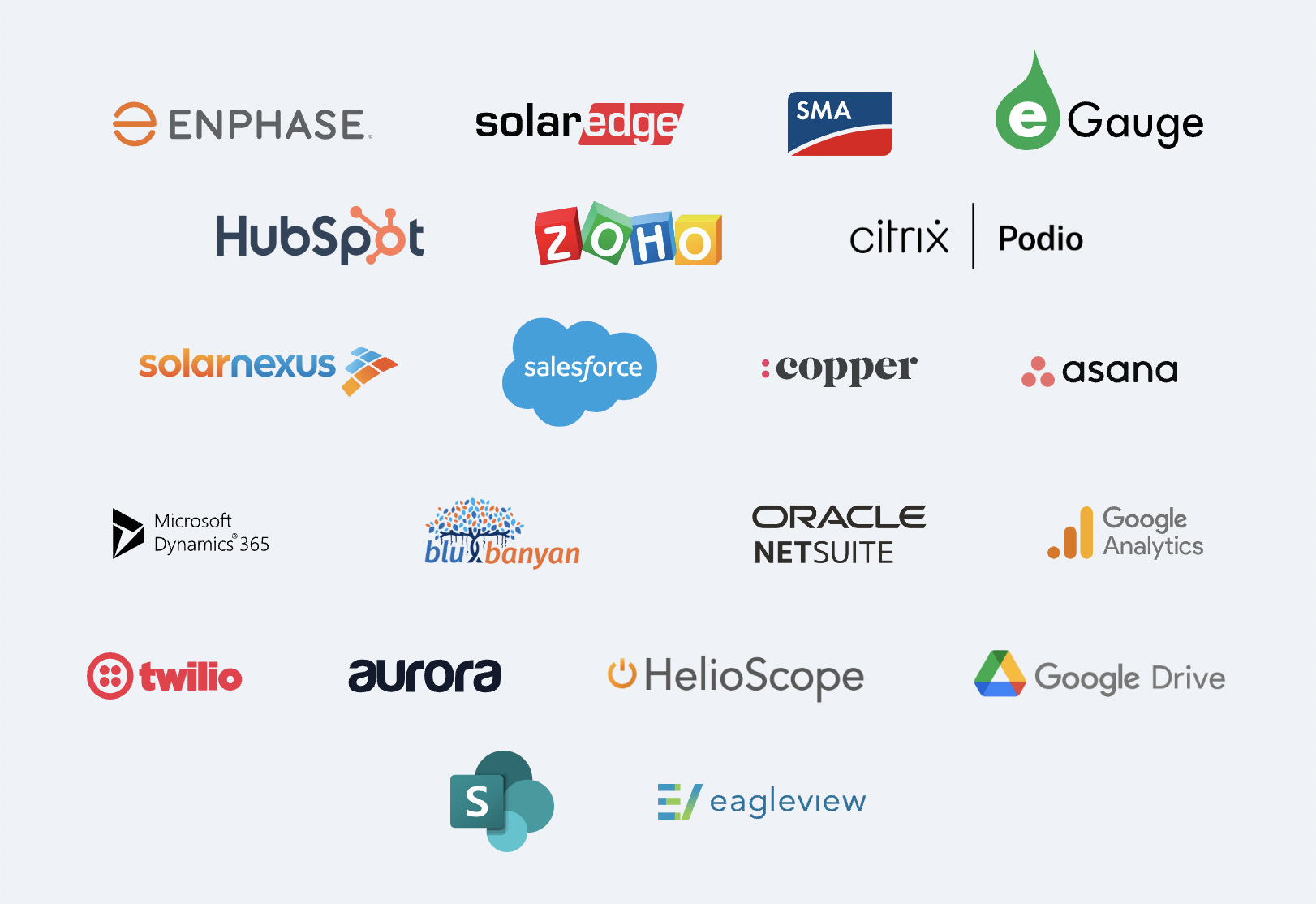
The amount of available Integrations might be one of the most important features for your Customer Portal. If it doesn’t tie in seamless with your existing systems it is unlikely that your company will adopt it and make actual use of it.
So first and foremost it means it should integrate with your existing Customer Relationship Management System (or solar CRM). No matter if you are using HubSpot, SalesForce or a Solar specific CRM like Solar Success or JobNimbus, the Customer Portal should automatically pick up changes and if the integration is smart enough even propagate those changes from the portal back to your CRM.
The next thing is of course Inverters:
If you have been in business for a while it is most likely that you have legacy systems from multiple inverter brands that you worked with over the years. As diverse as the Inverter Landscape is, so should be the list of inverters your solar customer portal can connect to.
But it doesn’t stop here:
There is a multitude of solar specific software like Aurora, SolarGraf, EagleView or adjacent hardware like Lumin, Emporia or Sense. It is paramount that your customer portal is not only aware of them but offers tight integrations with them creating a seamless experience for both your team and your end customers.
Ideally the customer portal can become a centerpiece of the IT systems of your company, tying up loose ends and integrating with everything from the CRM to the billing and payments system.
When is the right moment to invest into a customer portal
This is just like saving and investing money.
The earlier the better.
Of course this depends entirely on the type of company you are building and the ambitions and growth targets you ultimately have.
Solar Installation businesses come in all shapes and sizes.
So for simplicity let’s say as soon as you are doing more than 5 projects a month it makes sense to invest into a customer portal. Especially as the investment can be relatively small and scale together with your business.
The reason you better get going sooner rather than later is compound growth just like you can find in finance:
You work hard (and might pay dearly) for every customer you sign up for your solar business. If you do a great job in installing their system, you lose out every single time you send off that customer to a big brand right after the installation.
After a couple of years people tend to forget about your company and only remember the hardware manufacturer. So when somebody asks them what type of solar system they should be getting they might say “Get an Enphase system, I am supper happy with that” and you lose out on a referral that should have been yours.
Compare that to the different approach, where you continue to own the customer relationship over the lifetime of your system. If a specific percentage of your customer base recommends you today (let’s say 5%) and you can double that percentage with a customer portal (let’s say 10%) the growth of your referral engine will compound over time and generate significant returns in the form of increased customer satisfaction, reviews, and revenue.
This is exactly what we have been seeing for our own companies, where referrals tripled for two years in a row after we started introducing our own customer portal:
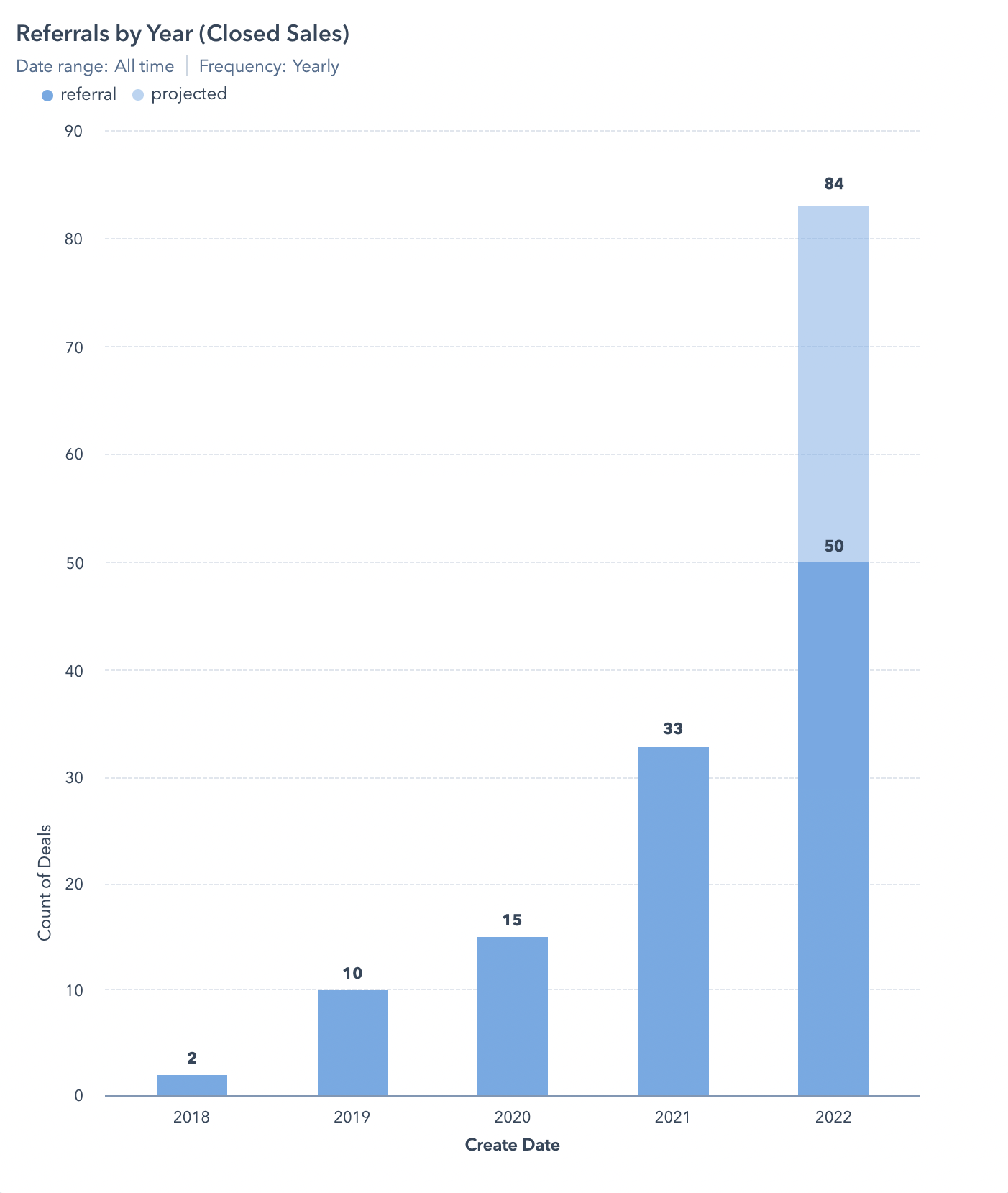
And the cherry on top?
With a great customer portal you might actually be able to generate additional high margin revenue so that it does not only pay for itself, but continues to drive value to your bottom line and even increases your average customer value.
If you are doing (even significant) more than 20 installs a month, it is safe to say that you are loosing out on multiple millions of dollars of additional revenue and maybe even double digit year over year percentage growth if you don’t have a customer portal in place yet.
Why your own branding is so important
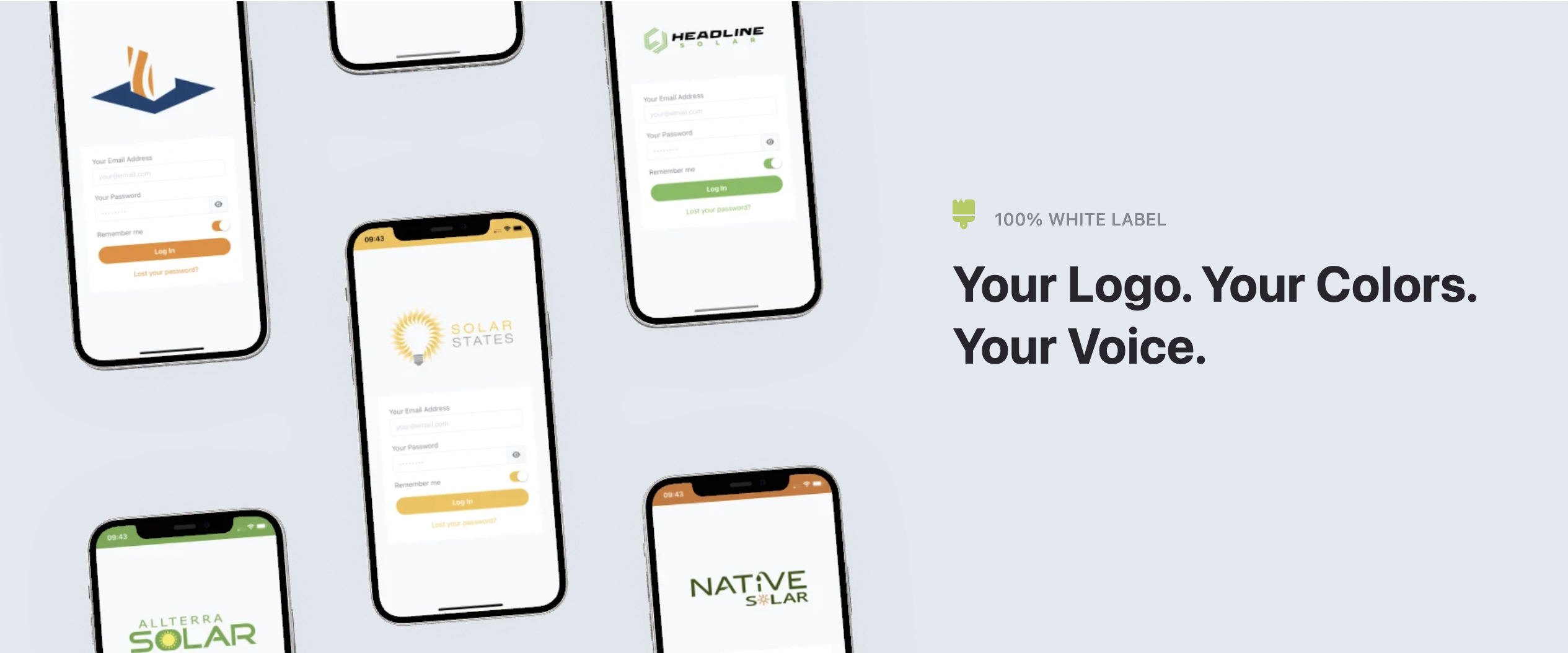
Your customer portal is the center piece of your customer relationship. Ideally that customer relationship lasts for 25 years or more.
You shouldn’t give away that valuable relationship to yet another brand.
That has been one of the main motivations behind building Sunvoy.
When we started to look for an existing solution for our own $10 million a year solar installation business we just couldn’t find one that didn’t try to put their own brand first.
So we decided to build our own instead. And instead of pushing the Sunvoy brand, we put the solar installation companies brand first and center.
We know how dear your brand and business is to you. And that’s why we give it the stage it deserves.
This starts by allowing our installers to display their logo and colors, use their tone of voice and customize everything to their own internal processes and operations. And it doesn’t end here. After seeing our success countless of competitors have tried to emulate our approach to branding, only to do a half-baked approach where emails are still being sent from their own email address or domains still include the customer portals company name.
Humbleness goes a long way. At Sunvoy we got nothing to sell to your end customer. That relationship belongs only to you and you should be the main point of contact for everything.
Buy don’t build: How to blow $100k saving money.
Why not build it ourselves? This is the initial gut reaction most solar companies have when they think about implementing a "simple" customer portal.
Instead of adding yet another monthly subscription to my expenses, why should I not just invest a hundred thousand dollars as a one time fee and build it myself instead?
The reality is:
Many have tried, most have failed.
Take our good friends at Revision as an example. They thought about doing it for years but never did and ultimately saw the benefit of going with Sunvoy instead:

And even if some have succeeded and actually went out to build something by themselves: Whatever they end up with is usually more akin to a half baked, provisional frankenstein monster than a world-class app that propels your business forward in every dimension and interaction.
The worst: It usually ends up costing a lot more than what they initially anticipated, not even taking in mind the opportunity cost of not having a professional solution in place and taking valuable focus away from the core business you have actual experience with.
The reason for that is that like many things it sounds easier than it actually is.
Building software requires specialized knowledge and skills that most companies do not have in-house. It requires expert knowledge in a broad field from user interface design, to user experience, behavioral science, complex distributed IT systems and advanced software development. All skills that are simply not required to run a successful solar business.
For the reasons above it is not enough to simply hire a software developer, instead you need to hire and manage an interdisciplinary team of experts in order to build truly exceptional software that delivers on your most pressing business problems.
Now think how hard it is to actually hire a good IT person – with the special breed of software developers it’s even more difficult.
Would you really be able to hire a multi disciplinary team composed of experts that each excel in their own area of expertise? Not doing it inevitably leads to mistakes and errors in the development process, resulting in poor-quality software that does not meet the needs of your company or your customers.
And this is only to get the very first version out.
But who maintains that beast once it has been launched? Who makes sure that the servers stay up at night or problems get troubleshoot on a weekend or important national holidays? What about uptime guarantees and data security? Adding new features and fixing bugs? Covering edge cases and answering technical support queries? Integrating with new hardware and software your company adopts as it grows?
Simple example:
At Sunvoy we deploy the app on multiple servers across the country and even the globe. So that it can be accessed lightning fast no matter where your customers are located. It is unlikely that you can put that level of effort into every little detail or build at a similar level of sophistication.
There is an important reason why even mature companies like Adobe decide to acquire a software like Figma for $25 billion instead of building it themselves. You would think that $25 billion would pay for a whole lot of software development. But the harsh reality is: building high quality software is as much an art as it is science. Even if you have like Adobe all of the resources of the world, you are not guaranteed to be able to replicate the “magic” of an already existing solution out there.
Or as Henry Ford put it:
"If you need a machine and don't buy it, then you will ultimately find that you have paid for it and don't have it."
Still not convinced? Think about the last time you relaunched your website. How smooth of a process was that? And a website is a lot simpler than a customer portal that ticks all of the boxes we talked about above. Now imagine launching and building a new website every month. Making sure that it adapts to the growing needs of your company so it enables your growth instead of stalling it. Beside the responsibilities of running your core business which you are already successful with and should focus on in the first place.
You should realize by now that spending money on something that ultimately enables you to make more money is not an expense:
It’s an investment.
In the end you wouldn’t recommend your customers to build their own solar system, would you? Especially not if building it themselves includes as well manufacturing their own panels and inverters.
Only within the last year we have launched a small or big improvement to Sunvoy on average every weekday – being a new feature or simple bug fix. This effort into continous improvement compounds over time. It is highly unlikely that you are able to replicate it at a similar pace, or at the quality and scale we do.
How do we know? Because many of our customers have switched to Sunvoy from their own in-house solution once they had the opportunity to do a direct comparison.
In the end: This is our bread and butter – this is our entire focus. We think about the type of problems to solve everyday and that’s why we are confident that no “in-house” solution can even come close to what we’ve build. And maybe worse: It eventually will end up costing you more than a convenient and small monthly investment into a proven software that already delivers business results for dozens of the largest solar installers in the US.
What to look out for in the team behind the software
As customer portals are such a common necessity in 2023 and beyond, there are a multitude of existing of both generic and solar specific solutions out there.
First of all: Don’t got with a generic one. Just because it comes with your CRM or might look like the simplest to setup it’s the wrong choice. The needs of the solar industry are too specific for a generic portal to capture all of the use cases and ultimately deliver enough value to you and your end customers. You will spend valuable time trying to bend it your way when in the end you should have gone with a solar specific solution from the get go.
But even if you decide to go with a solar specific one make sure to look below the surface:
In a growing industry like renewable energies a lot of marketers, designers and people from outside the industry without the slightest experience in solar try to come up with solutions that sound great in theory but don’t work well in pratice because they don’t know your daily issue as a solar installer.
Just conducting thousands of customer interviews is not enough. Instead look for a company like Sunvoy, where the team behind the software runs their own successful, $10 million a year solar installation business and understands your problems first hand from the perspective of the driver seat. (Yes, that’s us and we are very proud of our origin story)

You should as well not just go with the first “home build” solution you can find. As explained further up above, there is a lot of nuance in building and delivering production-ready software that is feature-complete at scale. There is a reason why experts on user interface, user experience and behavioral science exists. You want to look for a team that sits at the intersection of being a top residential solar installer and building world-class applications that drives business results. One wont work without the other because both fields will feed into each other to deliver truly exceptional software your customers and employees will love to use.
Take as well a look at the companies values. It's always a bad sign if they intentionally try to hide usage statistics from you and don't let you accurately assess if the adoption of your customer portal is actually successful. If they pair that by chaining you into long running contracts you better run. At Sunvoy on the other hand we will never hold you hostage to oppresive contracts and are fully transparent, displaying all important usage metrics for your App right on your Dashboard:
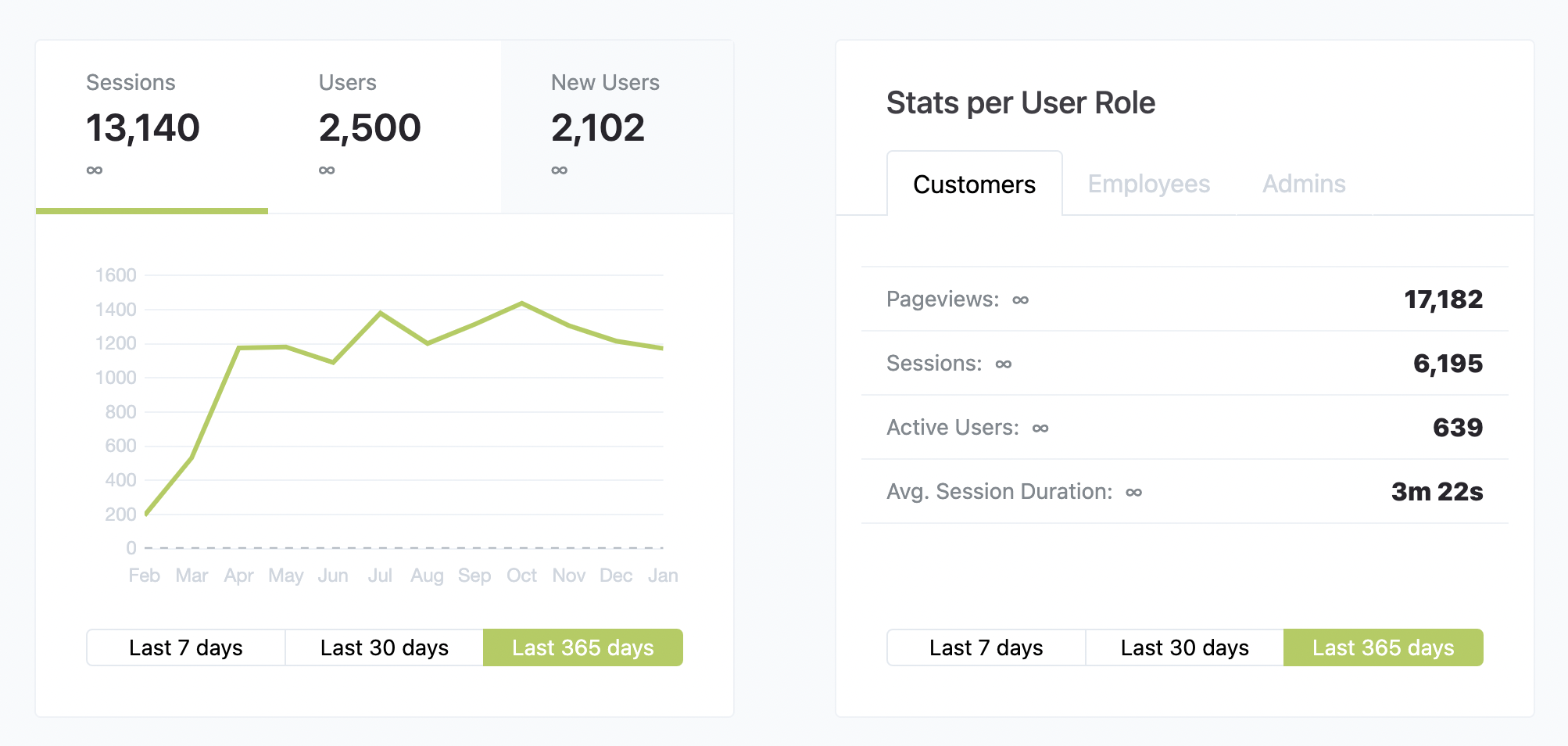
Make sure whatever company you choose is both self-funded and profitable as well, because otherwise you are giving up the centerpiece of your customer relationship to the casino of venture backed startups – where half of them end up bust and the other half get’s acquired by a market leader that decides to shut down the product a little later.
Decisions should be driven by your needs as a customer and not the financial gain of outside investors. Only with a self-funded profitable startups where the customers are the investors you get true alignment between your interest as a customer and the interest of the company.
Conclusion
If you are not using a customer portal yet you are loosing out on hundres if not millions of dollars in additional revenue.
We know first hand because we have been in the same spot with Ipsun Solar.
We have added and closed 85 additional referrals we wouldn't have had otherwise since we started using Sunvoy. At an avg. project value of $30,000, that's at least $2.5 million in additional revenue Sunvoy was able to generate.
This on top of additional high margin services we have been able to introduce thanks to Sunvoy and hundreds of employee hours we have been able to recover thanks to automation and better tooling.
This has not just proven true for our own Company Ipsun Solar, but as well across dozens of other top residential solar installers we are proud to call our customers.
That’s exactly why we decided to build Sunvoy: A branded solar customer portal and fleet management app that helps companies lower their cost of acquisition, streamline customer communications and improve overall customer experience leading to both happier customers and employees.
By providing a user-friendly and intuitive platform, Sunvoy helps companies be consistent with their branding both online and offline, build trust and loyalty and drive more referral business and better reviews within the process.
Our business and all of it’s processes are literally incomporable to before and after we've introduced Sunvoy.
To learn more about Sunvoy and how it can help your company make sure to check out our website or even better:
Schedule a free audit that goes into detail about the potential you are currently leaving on the table.
From "aha" to "oh crap", we're sharing everything on our journey to help install 100,000 residential solar systems per year.
We're learning a lot and so will you.
Residential solar systems installed through Sunvoy in the past year:
Real time metrics tracked bysunvoy
Jascha is an award winning top 1% Developer & Marketer. Being the Co-Founder & President of Sunvoy he loves building world-class apps that delight customers & change solar businesses for the better.